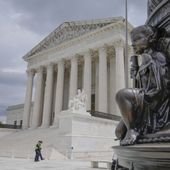The Bush administration announced yesterday that U.S. and Canadian children will be exempt from new rules requiring travelers to show passports when entering the U.S.
Children 15 or younger with parental consent will be allowed to cross the U.S.-Canada border at land and sea entry points with certified copies of their birth certificates rather than passports.
Youths 16 through 18 traveling with school, religious, cultural or athletic groups under adult supervision also will be allowed to use only their birth certificates.
“This is going to make it a lot easier for kids to cross the border,” Homeland Security Secretary Michael Chertoff said during a speech yesterday to the Detroit Economic Club.
Mr. Chertoff later toured the Detroit-Windsor Tunnel, a link with Windsor, Ontario, under the Detroit River.
The Department of Homeland Security may approve other documents, in addition to birth certificates, at a later time.
The new rules will take effect as early as Jan. 1, when the Department of Homeland Security’s Western Hemisphere Travel Initiative regarding land and sea travel are scheduled to be implemented.
Yesterday’s announcement came a day after Canadian Ambassador Michael Wilson told The Washington Times that the travel initiative must be implemented with “clarity and flexibility” to avoid damaging the world’s most dynamic bilateral trading relationship.
Trade between the U.S. and Canada totaled more than $740 billion last year. Canada also is the leading foreign trade partner for more than 39 U.S. states, Mr. Wilson said.
Americans and Canadians who travel by air, regardless of age, must show passports when crossing the border, as mandated by the initiative’s first phase, which went into effect last month. Those rules, which deal only with air travel, also apply to citizens of Mexico, Bermuda or Caribbean nations who enter the U.S., as well as Americans re-entering the country.
The rules were mandated by Congress in 2004 as a response to the September 11, 2001, terrorist attacks and the recommendations by the September 11 commission that border security be tightened.
In October, Congress passed an amendment sponsored by Sen. Patrick J. Leahy, Vermont Democrat, and Sen. Ted Stevens, Alaska Republican, to postpone the implementation of the land and sea rules for as long as 17 months, or until June 2009, if certain conditions have not been met.
One of those conditions was to develop an alternative procedure for groups of children traveling across the border under adult supervision and with parental consent.
The revised policy for children also was the result of talks among Homeland Security, Canadian and state and local officials in border states who were concerned that the new requirements would hurt legitimate travel and commerce, Homeland Security spokesman Russ Knockesaid.
“They’re sensible and balanced regulations that ensure that we can continue to fulfill our security goals while facilitating activities that are part of everyday life for border residents,” Mr. Knocke said.
The Department of Homeland Security and the State Department last year announced that the agencies will issue a new identification card intended to be a lower-cost alternative to a passport for Americans who travel frequently to Canada, Mexico, the Caribbean and Bermuda.
Homeland Security also this week began a program for travelers who say they have been incorrectly placed on the department’s “no fly” list or other security watch lists.
The Traveler Redress Inquiry Program (TRIP) allows travelers who say they have been erroneously delayed, denied boarding or identified for additional screening to file a petition online at www.dhs.gov/trip.
The Web site, which debuted Wednesday, is designed to streamline passenger misidentification issues among the department’s several agencies, including the Transportation Security Administration, Customs and Border Protection, and Immigration and Customs Enforcement.
The information will be shared with airports and airlines, Homeland Security officials said.



Please read our comment policy before commenting.